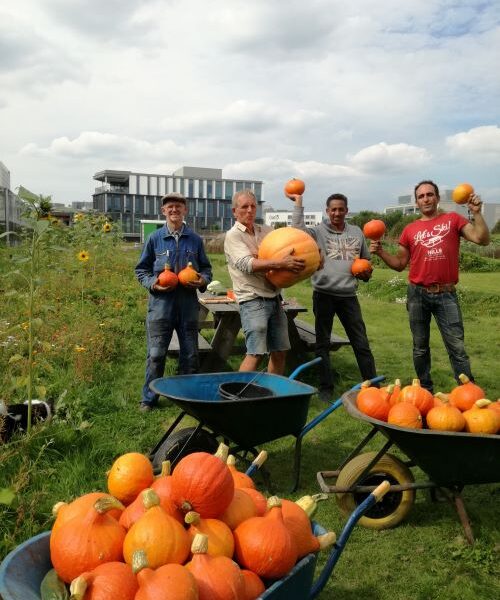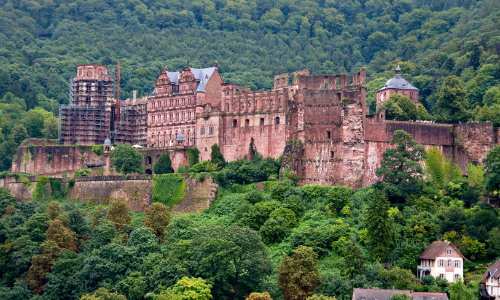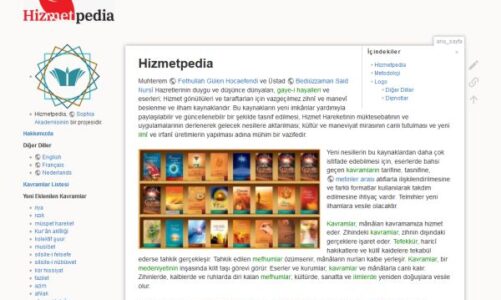Franke van der Laan, director of the MEERGroen (More Green) Foundation, founded in the Netherlands in 2011, answered Young Çağlayan’s questions.
Could you share a bit about your journey and what led you to establish the MEERGroen?
Franke van der Laan: At the age of 17 in 1968, I was active as a field biologist and discovered that mankind was digging its own grave by overexploiting the ecosystem. This led me to pursue a degree in biology. Initially, my studies focused on laboratory biology, which I quickly found unsatisfying. Instead, I was drawn to an emerging technology, remote sensing, which seemed more promising. Satellite imagery enables us to identify issues like deforestation, agricultural potential, erosion, and overpopulation—issues that appealed more to me. However, my ability to make a significant impact was hindered first by a war in Mozambique, where I was working for the UN. A 5-year career at the FAO headquarters in Rome taught me that I was not suitable to function in a large bureaucracy. Consequently, I shifted my focus to multinational enterprises to have more acting thrust. My language, remote sensing and ecological capabilities brought me a career as European marketing manager for expert systems in natural resources of an American ICT company. I gained a lot of experience, but the technological world is focused on bits and bytes. And my goal was to influence policies on true biodiversity and sustainability. Such policies and laws are made by lawyers, economists and other managers. Somy next attempt to achieve ecological and sustainable top-down impact got me into implemented environmental management systems in highly polluting French fry factories. The logic here is that the implementation of such systems are aimed at building up intrinsic motivation of factory workers, management and investors. But once again, I discovered that the real world and the paper world have very little in common.
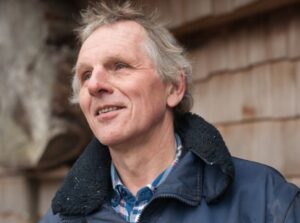
Franke van der Laan, director of the MEERGroen Foundation.
These 25 years of top down initiatives brought me a lot of experience but also frustration and ineffectiveness. So, I started a bottom up approach in 2004 by doing what made me happy: working in nature and with nature. That has been formalized in the MEERGroen Foundation in 2011. Our aim is to involve so many people in the Netherlands, Europe, and worldwide that we can connect grassroots ecological movements with top-down EU and UN policies. That is what MEERGroen is about. We have developed from 0.5 hectare of nature gardens with 30 volunteers to 1,100 hectares that we run with 2,000 volunteers. The 1,100 ha falls apart in 70 different projects and 25 different themes; flower meadows, vegetable gardens, forest estates, nature playgrounds, orchards, neighborhood parks, you name it. The are all fun and nice, but not all have the potential to link grass roots movement to main stream policies. But one of our projects does have the potential to unite mankind and to solve the climate crisis in an ecological way. We have now involved 22,000 people in 10,000 projects across six countries, in collaboration with several partners. Our aim is to mobilize 1 billion people worldwide.
MEERGroen emphasizes the activation of citizens and volunteers for nature management and ecological land care. Can you share a particularly inspiring story or outcome from your volunteer program that exemplifies the profound societal or individual impact of working with nature?
Let me share with you two examples:
1. In order to unite humanity and address the climate crisis, one must have the courage to take on challenges. Therefore, in all our projects, we embrace daily challenges without hesitation. Many people avoid starting new initiatives because they are intimidated by the effort required We currently manage 1,100 hectares of willingly adopted “disaster” areas that we are transforming into ecological and social paradises. We also teach our volunteers daily that they can achieve more than they think possible. This greatly helps boost their confidence and satisfaction with their work. At the end of each day, after addressing various projects, we take time to reflect on our achievements and consider future actions over a drink. Even I, always ready to embrace any challenge, am often surprised by how much we accomplish with inexperienced volunteers, exceeding our expectations.
2. The whole world is aiming for technological solutions to address climate change. Essentially, most people expect technology—such as windmills and electric cars—to solve the problem for them. This approach, which relies heavily on technology to reduce CO2 emissions, can be seen as lazy and decadent. As ecologists, we have observed that since about 1980, the global ecosystem can no longer buffer the excess CO2. Therefore, our MEERGroen ecological solution to eliminate this excess CO2 is to unite humanity and reclaim the 50–100 years we need (but no longer have) to build a truly sustainable society by planting 30 million km² of new forest within five years. In the Netherlands alone, we could save 5–10 billion seedlings from neglected forest areas if we had 1 million volunteers. Imagine what we could achieve worldwide. At MEERGroen, we have been doing this since 2009. Our method was adopted nationally in 2020 and internationally in 2023 with ever more partners. Our main partner is Urgenda and they have jointly involved many governments, companies and nature and environmental organizations as well. Since 2021, with 22,000 people involved, we have saved and distributed 2 million trees of 150 species for free to anyone who provides them space to grow. A 1-ounce sapling, in ten years’ time, can grow into 500–1000 kg of wood, fixing 1000–2000 kg of CO2. In that way we can use the unimaginable large exponential growth power of nature to pull all excess CO2 out of the air and regain the 50–100 yar that we do not have anymore from the cultural and technological restructuring of the global society.
MeerBomen.nu (MoretreesNow.eco) is our tree transplanting campaign that is now operating in six countries, just three years after its inception. We are eager to expand this initiative globally to educate urban populations about the value of ecology. Additionally, it is enjoyable, provides a great workout, and transforms depressive thoughts about climate change into positive energy. There are at least ten more benefits to this approach.
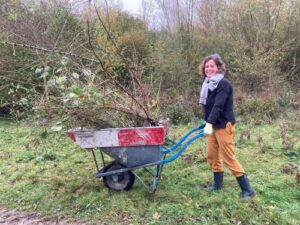
With a focus on maximizing biodiversity through ecological management, MEERGroen undertakes the transformation of mismanaged areas into ecological paradises. What are the most significant challenges you face in these transformations, and how do you measure the success of your ecological restoration projects?
Unfortunately, there are many challenges—at least 30—that we need to overcome. The most critical issue is overpopulation; there are too many people on this planet, leading to ecosystem collapse under the weight of asphalt, concrete, chemical wastes, and other pollutants, as well as from the extraction of natural resources like fish and wood. This overcrowding has resulted in a governmental system that, despite good intentions, has produced millions of pages of bureaucratic regulations and penalties. This bureaucracy has led to a general standstill, as most people are too afraid to make decisions for fear of not adhering to moral and ecological responsibilities. Another consequence is that decision-making is largely driven by financial considerations, with a short-term focus.
Regarding how MEERGroen operates: we typically identify an area as a social and ecological disaster zone ourselves. In such areas, there is always potential for improvement, no matter how dire the initial situation. Through social media and newspaper articles, we connect with people who share our ideals and have a relationship with the piece of land in question. We then approach the landowners—often municipalities—to take action. Having done this for 20 years and demonstrated the benefits of social cohesion and biodiversity, the threshold for initiating new projects is increasingly lower, allowing us to start new initiatives more easily. We currently co-manage 1,100 hectares and have just secured access to an additional 4,500 hectares.
Education plays a crucial role in your mission, from practical skills development to fostering a deeper understanding of ecological systems. Could you discuss a project or initiative that you feel has significantly advanced ecological education among your participants, particularly among the younger demographic?
Most of our volunteers are modern-day urban or office workers. Only 150 of our 2,000 volunteers participate regularly on a weekly or monthly basis. The rest are apprentices from schools or office workers engaged in team-building or corporate social responsibility (CSR) activities. We strive to make every working day an ecological and practical learning experience. To lower the barrier to participation, we offer group workdays seven days a week and provide 25 different kinds of projects, each with 10 different types of tasks, ranging from heavy duty to very light work; this variety ensures that everyone can find something to their liking. We also offer both outdoor and indoor options. Within the first hour of every working day, we mold groups of 10–50 people into efficient, productive teams. We emphasize that every step in nature can be an inspiring experience, rich with edible or medicinal applications and ecological interactions (either parasitic or symbiotic). Our experience shows that virtually everyone appreciates this ecological perspective. Additionally, we place a strong focus on keen observation and practical skills.
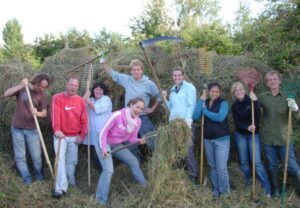
The foundation prides itself on working efficiently and economically, leveraging the inspiration and motivation of volunteers. How does MEERGroen balance the need for economic efficiency with the goal of ecological sustainability, and can you provide an example of how out-of-the-box thinking has led to a successful project outcome?
We work efficiently by doing what we want and not so much what we have to do.. We embrace challenges and consistently try to exceed expectations. We also operate economically in various ways. First, the major cost factor in most jobs is excessively high wages. Due to those ever-increasing wages, “time is money,” and globally, we are caught in a race to the bottom, competing for ever cheaper methods. In this process, the enjoyment of work is often overshadowed by a focus on money. With our volunteer labor, we avoid these high costs, allowing us to exchange time and money freely. Thus, we can prioritize quality management over quick, substandard solutions.
Secondly, we work very economically by cooperating with nature rather than working against it. Unlike many others, we don’t purchase trees; we find them by the billions in nature. Over three years, we have rescued 2 million trees and distributed them for free to anyone willing to provide space for them to thrive, thereby enhancing biodiversity and capturing CO2. Considering the cost of 1–10 euros per tree, this equates to 3-10 million euros of social and ecological value. Similarly, we gather our own flower seeds from our 30 hectares of flower meadows. In a productive year, we can collect 150 kg of seeds, worth between 100-300 euros per kilo, saving approximately 20,000 euros. Instead of selling these seeds, we use them to expand our areas of biodiversity. Also many people enjoy this light-duty task of collecting clean seeds thus enhancing the feeling of satisfaction and productivity. We apply the same principle to flower bulbs, which cost about 0.1 euros each. By planting 30,000 bulbs and managing them well, they can multiply to a million in six years due to exponential growth (doubling years: 30, 60, 20, 240, 480, 960). We then dig them up, split the clusters, and use them to beautify other areas. Similarly, we convert 5 kg of vegetable seeds, costing 500 euros, into 30 tons of produce, which we sell to restaurants and caterers for 0.5–1 euro per kg. This exemplifies our approach: working with nature for nature, as nature serves as our nursery!
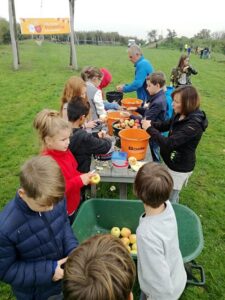
Given the foundation’s interest in forming partnerships to address environmental crises and societal challenges, could you share insights into how MEERGroen selects and collaborates with partners? Furthermore, what do you believe are the key elements for a successful partnership in achieving social and ecological balance?
Essentially, we are striving for a society in balance with nature, envisioning a future that extends beyond the current 5–10 year horizon to one that lasts 100,000 years or more.
Our daily goal is to foster fun and inspiration. Anyone who resonates with this vision is a potential partner. Unfortunately, most people are too preoccupied with surviving or pursuing short-term financial goals to see the benefits of this approach. Typically, no more than 5% of society is receptive to our hands-on ecological methods. Therefore, we aren’t overly selective; urban society has its preferences and will likely only shift from an economic focus to an ecological one when it’s too late. Thus, anyone is welcome to join us. When people show interest, we focus on the possibilities rather than any discrepancies. Unlike many environmental organizations, we do not shy away from collaborating with entities like oil companies. We acknowledge that no one can live a 100% sustainable life. Whether it’s personal choices (like international travel or eating meat) or business practices (such as building data centers), if someone is seeking a partnership to improve their sustainability record, we are open to it. We are confident enough to help elevate a 5–50% sustainability initiative to a range of 10–80%. Excluding or demonizing potential partners isn’t productive.
In our efforts, we aim to build social, commercial, and political support and alliances to mainstream true sustainability within our economic, legal, and technological urban framework. After 20 years of demonstrating a bottom-up approach, we are nearing a point where the severity of climate change could finally open minds to ecological solutions, such as uniting humanity to add 30 million km² of forest to combat climate change and gain the 50–100 years we currently lack. By partnering with mainstream organizations, we strive to reach a turning point where people are not ashamed to get their hands dirty but fear missing out if they don’t join.

